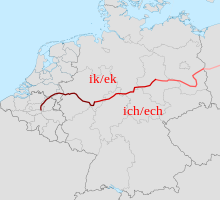isogloss
Jump to navigation
Jump to search
English
[edit]Etymology
[edit]
From iso- + gloss, ultimately from Ancient Greek ἴσος (ísos, “equal”) (possibly from Proto-Indo-European *wi- (“to separate”)) + γλῶσσα (glôssa, “tongue; language”) (ultimately from Proto-Indo-European *glōgʰs).
Pronunciation
[edit]- (Received Pronunciation) IPA(key): /ˈaɪsə(ʊ̯)ɡlɒs/
Audio (Southern England): (file)
- (General American) IPA(key): /ˈaɪsəɡlɑs/
- (Canada) IPA(key): /ˈaɪsoɡlɒs/, /ˈʌɪ-/, /-sə-/
- Hyphenation: iso‧gloss
Noun
[edit]isogloss (plural isoglosses)
- (linguistics) A line on a map indicating the geographical boundaries of a linguistic feature.
- Synonym: heterogloss
- 1921, The Calcutta Review, Calcutta: University of Calcutta, →OCLC, page 285:
- Bloch thinks (and we agree with him) that details of isogloss will probably not bear out this kind of grouping.
- 1970, W[illiam] F[oxwell] Albright, T[homas] O[den] Lambdin, “The Evidence of Language”, in I[orwerth] E[iddon] S[tephen] Edwards, C[yril] J[ohn] Gadd, N[icholas] G[eoffrey] L[emprière] Hammond, editors, The Cambridge Ancient History, 3rd edition, volumes I, part 1 (Prolegomena and Prehistory), Cambridge: Cambridge University Press, published 2000, →ISBN, section IV (Sumerian, Hurrian, Urarṭian, Elamite), page 154:
- There was also a tendency to treat transitive verbs passively, as in Hurrian and Urarṭian; it must, however, be emphasized that this phenomenon may also be considered as an isogloss rather than as an indication of genetic relationship.
- 2005, Brian D. Joseph, Carol G. Preston, Dennis R. Preston, editors, Language Diversity in Michigan and Ohio: Towards Two State Linguistic Profiles, Ann Arbor, Mich.: Caravan Books, →ISBN, page 29:
- The convergence of multiple isoglosses on a map, a "bundle", indicates a boundary between one regional dialect and another.
Hyponyms
[edit]Derived terms
[edit]Translations
[edit]line indicating geographical boundaries of a linguistic feature
|
See also
[edit]Further reading
[edit]Categories:
- English terms prefixed with iso-
- English terms derived from Ancient Greek
- English terms derived from Proto-Indo-European
- English 3-syllable words
- English terms with IPA pronunciation
- English terms with audio links
- English lemmas
- English nouns
- English countable nouns
- en:Linguistics
- English terms with quotations
- en:Isolines